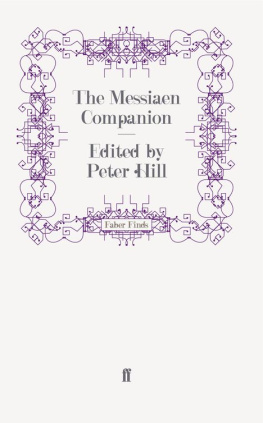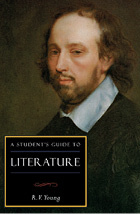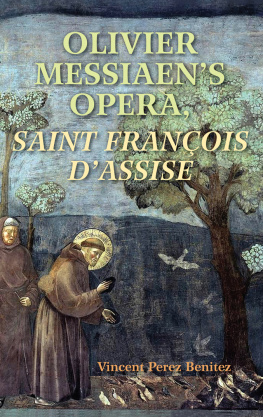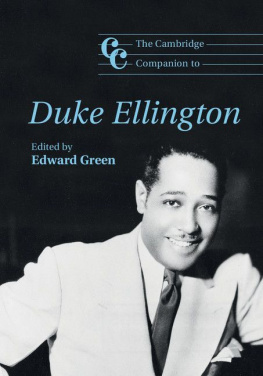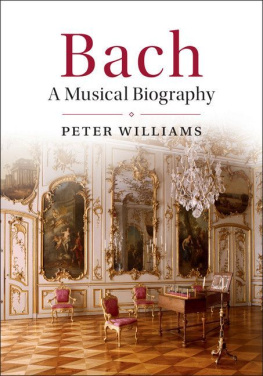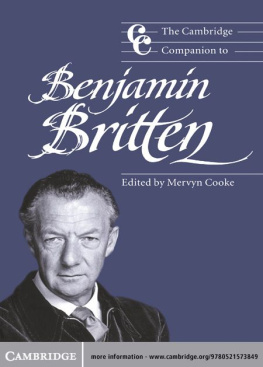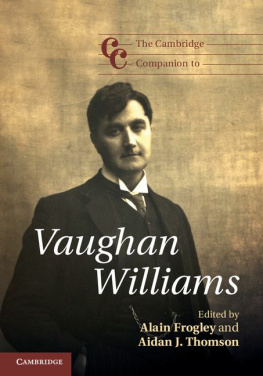Photographs 13 reproduced by permission of Roger-Viollet; 410 copyright Malcolm Crowthers.
With Messiaens death, on 28 April 1992, music lost a figure remarkable for this or any age. Almost alone among the supreme artists of the twentieth century Messiaen was an optimist , so that even his most radical ventures into new territory were never mere dabbling with the bizarre, but always embedded in a clear purpose and conviction. Indeed the key to his achievement and to his paradoxical position in musical history is that he combined in the highest degree the mind of an innovator, of an explorer, with skills and beliefs which were rooted in tradition. A musicians musician organist, pianist, improviser, and with a musical ear of legendary acuteness the musical heritage which he had at his fingertips seems never to have hampered his decisive originality (any more than did his lifelong, unquestioning commitment to Catholicism). In this respect, among his near contemporaries only Bartk was his equal; and, like Bartk, for all his uncompromising intelligence Messiaen had at his heart a simplicity which makes his music universal.
TheMessiaenCompanion is the first major study since Messiaens death, the first to view his life as a completed whole. There is necessary catching-up to be done, with an account of the last works (including the posthumously premiered Eclairssurlau-del), and a reappraisal of the masterpieces of the 1960s and 1970s. Where previous accounts of Messiaen have tended to view him as a vast but monolithic presence, the portrait that emerges here is complex and many-sided. In part this is a reflection of the talents and interests of my contributors; significantly, a number of these are practising musicians, and indeed, almost all bridge the worlds of scholarship and music as a living art. But the books diversity is also a consequence of its design, which focuses not only on Messiaens music but on other aspects of his achievement.
The Companion falls into two very unequal halves, dividing around 1950, a time of radical new departures after the climactic achievement of Turangalla. In the Interlude, a series of essays consider the inspiration of nature, and birdsong in particular ; Messiaens highly idiosyncratic approach to colour; and his theological outlook is set in context, and examined in relation to the Quatuorpourlafindutemps. The section concludes with tributes to Messiaen as a teacher, and an interview with the composers widow, Yvonne Loriod-Messiaen, which contains much previously unrecorded biographical detail.
Before expressing my thanks to the numerous individuals who have helped in the preparation of this book, I should first like to record my deep gratitude to Messiaen himself, who advised, encouraged and inspired me in the study and performance of his music, and gave me unstintingly of his time. My profound thanks also to Mme Loriod-Messiaen, not only for her contribution to the book, but for making available unpublished material, and for her kindness and hospitality over many years.
The generous provision of music examples has been made possible by the willing co-operation of Messiaens publishers: Durand et Cie, Alphonse Leduc et Cie, Editions Salabert and Universal Edition. I am most grateful to the staff at Faber and Faber for help at every stage of the books genesis, in particular Helen Sprott, Andrew Clements, Jane Feaver and David Watson; to Elizabeth Holloway and Virginia Messenger for secretarial help, and to Ruth Jordan who transcribed meticulously the interview with Yvonne Loriod. I also received invaluable assistance from Christopher Sayward (of United Music Publishers) and Timothy Day of the National Sound Archive. Among friends and family who advised and encouraged were Bob Auger (engineer of all my recordings of Messiaen), George Benjamin, Malcolm MacDonald, Anthony Pople, and last (though she should be first) my wife, Charlotte, who was a constructive critic of my first drafts, and gave me constant support and encouragement. My particular thanks go to Christopher Dingle, who not only supplied the invaluable Catalogue of Works and Discography but placed his encyclopaedic learning at the service of eliminating errors; and finally to Ingrid Grimes, my dedicated copy-editor, who rooted out inconsistency and infelicity from my far from immaculate typescript, and who, moreover, contributed countless positive suggestions which have been immeasurably to the books benefit.
PETER HILL
Sheffield
September1994
PETER HILL
Olivier Messiaens life is remarkable for its scale. With a composing career spanning seven decades, only Stravinsky, of the major figures of the twentieth century, is his equal. Unlike Stravinsky , however, and unlike either Tippett or Carter (both, like Messiaen, composers active in their eighties) Messiaen was astonishingly precocious, still only in his teens when he reached a first maturity, if by that one means the discovery of a voice uniquely and unmistakably his own. Indeed Messiaens life is best described as a series of maturities, his achievements coming in waves, given impetus by periods of self-renewal, undertaken either in response to circumstance or as conscious experiment. By far the most significant occurred around 1950, a sea-change reflected in the design of this book, which divides the music before and after this date with an interlude, a group of essays exploring facets of Messiaens work. But although it is possible to separate Messiaens life into sections, to do so is, in his case, especially artificial; for perhaps Messiaens most remarkable trait was the firmness with which he kept faith with a basic set of principles, so that the language (and to a very great degree the technique) of Messiaens earliest music is still apparent in the music composed sixty or so years later.
This unity was important to Messiaen as the means by which he kept to his course through the artistic upheavals of his time; yet it was not bought at the price of sealing off the outside world. On the contrary, Messiaens life (from his mid-thirties) was increasingly a public one: he was active as organist, teacher and performer (and for the last three decades in worldwide demand at concerts of his music), with only the precious summer break reserved for privacy and composing. More than ).
Although Messiaen cast his net widely, certain fundamentals were ever-present. The main sources of inspiration are reflected on the bookshelves of his study in Paris. Prominent are the volumes of Shakespeare in the translation by his father, Pierre. The lower shelves are occupied by musical scores, while above space is equally divided between books on birds (in Messiaens own view he was as much ornithologist as musician) and works of theology. This modest room, left exactly as it was at the time of Messiaens death, is symbolic of the anomaly which struck all who met him: that the composer of music so transcendent in ambition and scale should have lived life so simply. Quietly spoken, Messiaen explained himself with the calm lucidity of the practised teacher. He possessed exceptional clarity of mind, and applied the same methodical care to all aspects of his life. His attention to detail was legendary, and in the more mundane duties of a composer he led his pupils by example, prescribing in his scores every detail of fingering or registration, and taking immense pains to eliminate all trace of ambiguity, let alone error. His students were amazed that so eminent a musician should devote so much time to teaching; and he was similarly punctilious over his duties at La Trinit, where neither age nor infirmity would deter him from climbing the sixty or so steps to the organ loft in order to accompany Sunday services.

